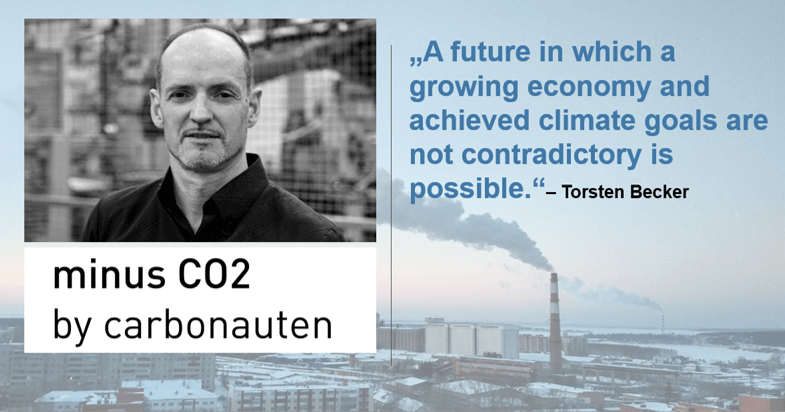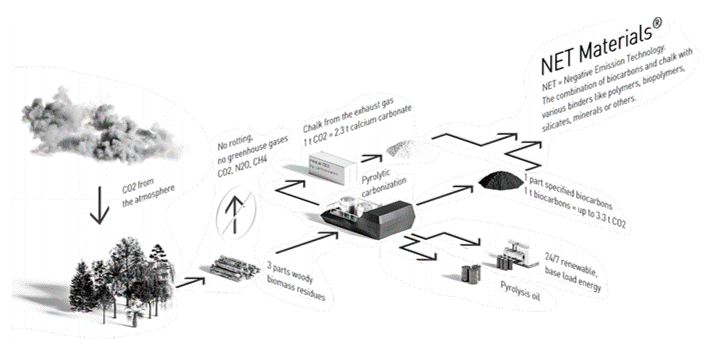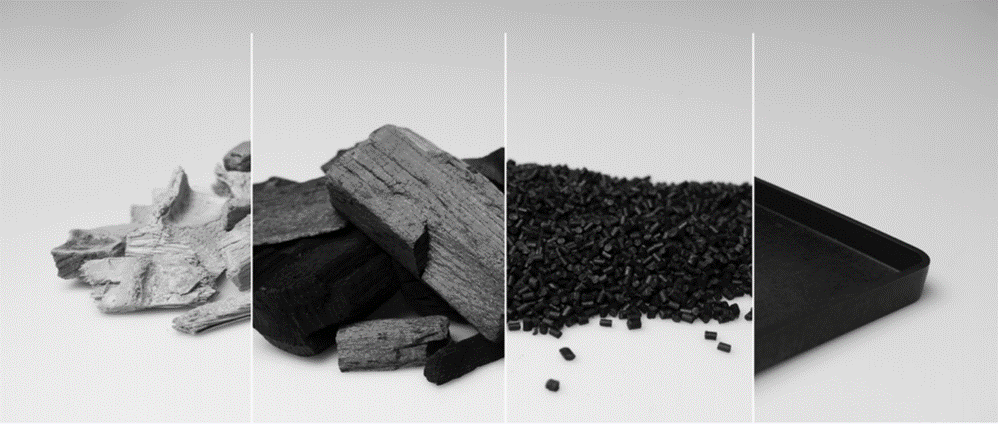Minus CO2 - if not now, then when?
Katharina Kittelberger
Worldwide, about 400 million tons of plastic of all kinds are produced each year. The problems of this are far-reaching: emissions, toxic by-products or high energy consumption are just a few examples. So far, a total of 6.3 billion tons of plastic have been produced, 70% of which is found in nature.
Torsten Becker and Christoph Hiemer no longer wanted to sit back and tolerate this current situation, which is why they founded the startup carbonauten in 2017.
With their pyrolytically produced biocarbons and pyrolysis oils from biomass residues, the two developed a system unique to the chemical industry that effectively reduces their CO2 emissions and costs immediately, as well as enabling rapid transformation toward environmental, social and economic sustainability.
 One of the dreamers and founders of the startup Carbonauten, Torsten Becker
One of the dreamers and founders of the startup Carbonauten, Torsten Becker"minus CO2 is my passion," says Torsten. In an interview with 5-HT, he explains how their innovation works and why it is of particular interest to companies in the chemical, construction, plastics, agrochemical, pharmaceutical and energy sectors.
Nothing less than helping to save the world - the dream of the carbonauts
A future in which a growing economy and achieved climate goals are not contradictory is possible, according to Torsten. "The requirement for this is a sustainable circular economy, which is based on our innovative system. The special thing about this is that no CO2 is produced. On the contrary: in the so-called Negative Emission Technology (NET)- Materials® developed by us, this CO2 is in fact stored."
That way, the carbonauts can help industry move toward a lower CO2 future today.
Broken down a bit: How exactly does your concept work?
Here, Torsten also acknowledges that the topic is quite abstract. Nevertheless, he explains, "In principle, we extract CO2 from the atmosphere in a decentralized and industrial way and store it permanently in our NET- Materials®. These consist of pyrolytically produced biocarbons and various binders."
Each ton of carbonauten biocarbon permanently stores up to 3.3 tons of CO2.
can be used to supplement or even replace many petroleum-based materials, products and systems, such as those used in plastics, agrochemicals and the pharmaceutical industry.
They generate new properties and have enormous R & D potential, are in harmony with nature and can be produced decentrally at low cost.
 The carbonauten -system as a CO2 solution for the industry
The carbonauten -system as a CO2 solution for the industryWe don't sell our technology but operate production-sites where these carbons are decentrally produced.
"Our process," adds Torsten, "has also recently been approved by the Potsdam Institute for Climate Research as one of six negative emission technologies."
Is there a concrete example that can be used to vividly explain your concept?
"There are a few. Using the example of organic green carbon, also known as Terra Preta, the concept of CO2 saving can be explained as such: A tree consists of 50% carbon. When this tree weathers at the end of its life, the CO2 re-enters the natural cycle. This is exactly the process we interrupt with pyrolysis by producing a biocarbon, in this case in the form of barbecue charcoal. This is then combined with compost to become a permanently fertile soil substrate that stores water, nutrients and CO2. The biocarbon remains for hundreds, even thousands of years, which causes the CO2 reduction.
We are also currently researching how wind turbine blades can be recycled after their short lifetime of only 15 - 20 years. Our approach is to shred them and then carbonize them," Torsten explains. This process breaks the wind turbine blades back down into their original basic building blocks.
Our core: simplicity. Only when things are simple do they really work.
"So we have the possibility to use different biomass residues to produce biocarbons."
What exactly are these biomass remains? And what can you produce from them in turn?
"First of all, suitable biomass remains are available worldwide," Torsten emphasizes. He goes on to say, "Our robust pyrolytic carbonization technology enables the production of specific biocarbons from various woody biomass remains from the forestry, agriculture, food and wood industries."
Examples include cuttings from the sawmill, wood chips, all kinds of nut shells and kernels, and pressed oil remains. "But they are also problem materials, such as the woody part of green cuttings and screen overflows from composting. All of these materials are often wastes that either rot, are burned or buried," he adds.
 CO2 - From waste to vaule
CO2 - From waste to vaule"We then use these materials to make products such as organic barbecue charcoal, activated charcoal and feed charcoal, but also fertilizers and plastics."
Shaking up conventional industries. What alternative do you offer to achieve that?
"Especially here it becomes clear again how we can achieve a permanent reduction of CO2 via this route: Because by combining conventional plastics with our carbonauten carbons, fossil polymers can be saved."
Thus, less petroleum and refinery is needed, which ultimately means a reduction in CO2. But it gets even better: "In addition, our finished plastics are given new properties. Namely, they become more UV stable, harder, more precise, lighter, cheaper and many times more temperature resistant."
carbonauten plastics can withstand temperatures of up to 500°C. No conventional plastic can do that.
"At the same time, the application areas in which our system can be used are huge," Torsten points out. "In addition to markets such as plastics, agroforestry, pharmaceuticals, and construction, our exemplary target markets include transportation, heavy industry, and energy."
One advantage follows the next: further gains from carbonization.
NET biomaterials are not only more ecological than petroleum-based materials, but also more economical. For example, their production generates base-loadable, surplus and renewable energy.
"For this reason, our future steel construction plants will also not need to be heated externally, but will run on their own," Torsten laughs.
Our factories produce up to 850 °C of excess energy.
Of the energy generated in the factories, only about 5% is needed for the carbonization process. Another 5% is lost through waste heat. But the remaining 90% of excess energy can be sold.
"In summary, in addition to biocarbons and renewable energy, the biomass residues also produce high-value oils and CO2 certificates," Torsten explains. "Companies can have these CO2 certificates issued to them, and in turn sell them on the market." From all these factors, carbonauts generate their profit.
The result of carbonaut innovation is disruption.
After all, the more plastics made from NET materials are used, the better it is for both the environment and the economy. "By permanently storing CO2, we not only reduce climate gases," says Torsten, "but also precisely the proportions of fossil and biogenic polymers."
Another positive side effect here is that the process does not compete with food or arable land because the products are generated by biomass remains. Thus, the high functionality of the carbonauten concept makes it not only attractive for business, but also compatible with all plastics processing technologies, such as extrusion, injection molding or foaming.
A great concept. Were there any setbacks along the way?
"There were a few," Torsten grins. "What caused us the greatest difficulties was the financing factor. Unfortunately, in my opinion, this is a fundamental problem: investors are usually business economists, whereas startups are made up of risk-taking scientists. These two speak very different languages," says Torsten.
So when asked where the risks are, he responds with the counter question, "Let's talk about the opportunities."
Our passion for adventure is reflected in our persistence: we don't let ourselves be carried away.
"We are also enormously proud of this mentality. Although the construction of our first steel construction plant in Germany was financed this year, money is still tight at the moment," says Torsten. "But we are a solidarity-based company. We don't let ourselves be influenced by such factors."
Expanding networks and locations through 5-HT
These are the aspects the carbonauts hope to gain from the collaboration. "The chemical industry fits very well with what we do. That's why we see opportunities in the cooperation with 5-HT to make our products better known in precisely this area," Torsten explains.
In addition, he sees many advantages in collaborating with other startups, with whom contact can be established through 5-HT's network. "We've already met brilliant startups with huge ideas," says Torsten, "it's exciting to be at the source through 5-HT."
5-HT Chemistry & Health Newsletter
Want the latest tech and industry news, events, relevant info from the ecosystem and more?
Subscribe to 5-HT Newsletter now Subscribe to 5-HT Newsletter now
Become part of the 5-HT Chemistry & Health
Exchange ideas with innovative startups and future-oriented companies in our ecosystem. We look forward to meeting you!